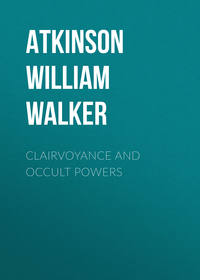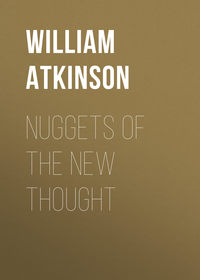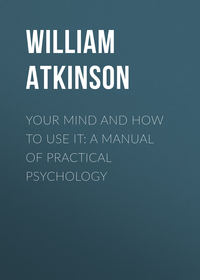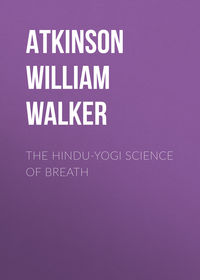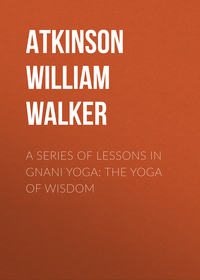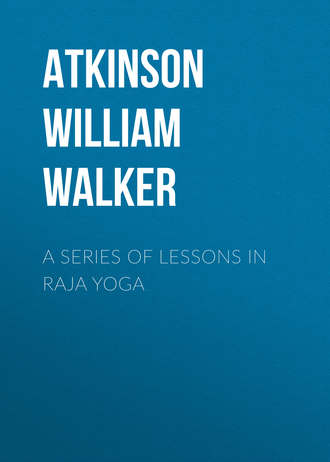 полная версия
полная версияA Series of Lessons in Raja Yoga
THE EIGHTH LESSON.
THE HIGHLANDS AND LOWLANDS OF MIND
The Self of each of us has a vehicle of expression which we call the Mind, but which vehicle is much larger and far more complex than we are apt to realize. As a writer has said "Our Self is greater than we know; it has peaks above, and lowlands below the plateau of our conscious experience." That which we know as the "conscious mind" is not the Soul. The Soul is not a part of that which we know in consciousness, but, on the contrary, that which we know in consciousness is but a small part of the Soul—the conscious vehicle of a greater Self, or "I."
The Yogis have always taught that the mind has many planes of manifestation and action—and that many of its planes operated above and below the plane of consciousness. Western science is beginning to realize this fact, and its theories regarding same may be found in any of the later works on psychology. But this is a matter of recent development in Western science. Until very recently the text books held that Consciousness and Mind were synonymous, and that the Mind was conscious of all of its activities, changes and modifications.
Liebnitz was one of the first Western philosophers to advance the idea that there were planes of mental activity outside of the plane of consciousness, and since his time the leading thinkers have slowly but surely moved forward to his position.
At the present time it is generally conceded that at least ninety per cent of our mental operations take place in the out-of-conscious realm. Prof. Elmer Gates, the well known scientist, has said: "At least ninety per cent of our mental life is sub-conscious. If you will analyze your mental operations you will find that conscious thinking is never a continuous line of consciousness, but a series of conscious data with great intervals of subconscious. We sit and try to solve a problem, and fail. We walk around, try again, and fail. Suddenly an idea dawns that leads to the solution of the problem. The subconscious processes were at work. We do not volitionally create our own thinking. It takes place in us. We are more or less passive recipients. We cannot change the nature of a thought, or of a truth, but we can, as it were, guide the ship by a moving of the helm. Our mentation is largely the result of the great Cosmic Whole upon us."
Sir William Hamilton says that the sphere of our consciousness is only a small circle in the center of a far wider sphere of action and thought, of which we are conscious through its effects.
Taine says: "Outside of a little luminous circle, lies a large ring of twilight, and beyond this an indefinite night; but the events of this twilight and this night are as real as those within the luminous circle."
Sir Oliver Lodge, the eminent English scientist, speaking of the planes of the mind, says: "Imagine an iceberg glorying in its crisp solidity, and sparkling pinnacles, resenting attention paid to its submerged self, or supporting region, or to the saline liquid out of which it arose, and into which in due course it will some day return. Or, reversing the metaphor, we might liken our present state to that of the hulls of ships submerged in a dim ocean among strange monsters, propelled in a blind manner through space; proud perhaps of accumulating many barnacles as decoration; only recognizing our destination by bumping against the dock-wall; and with no cognizance of the deck and cabins above us, or the spars and sails—no thought of the sextant, and the compass, and the captain—no perception of the lookout on the mast—of the distant horizon. With no vision of objects far ahead—dangers to be avoided—destinations to be reached—other ships to be spoken to by means other than by bodily contact—a region of sunshine and cloud, of space, or perception, and of intelligence utterly inaccessible to parts below the waterline."
We ask our students to read carefully the above expression of Sir Oliver Lodge, for it gives one of the clearest and most accurate figures of the actual state of affairs concerning the mental planes that we have seen in Western writings.
And other Western writers have noted and spoken of these out-of-conscious realms. Lewes has said: "It is very certain that in every conscious volition—every act that is so characterized—the larger part of it is quite unconscious. It is equally certain that in every perception there are unconscious processes of reproduction and inference. There is a middle distance of sub-consciousness, and a background of unconsciousness."
Taine has told us that: "Mental events imperceptible to consciousness are far more numerous than the others, and of the world that makes up our being we only perceive the highest points—the lighted-up peaks of a continent whose lower levels remain in the shade. Beneath ordinary sensations are their components, that is to say, the elementary sensations, which must be combined into groups to reach our consciousness."
Maudsley says: "Examine closely and without bias the ordinary mental operations of daily life, and you will find that consciousness has not one-tenth part of the function therein which it is commonly assumed to have. In every conscious state there are at work conscious, sub-conscious, and infra-conscious energies, the last as indispensable as the first."
Oliver Wendall Holmes said: "There are thoughts that never emerge into consciousness, which yet make their influence felt among the perceptible mental currents, just as the unseen planets sway the movements of those that are watched and mapped by the astronomer."
Many other writers have given us examples and instances of the operation of the out-of-consciousness planes of thought. One has written that when the solution of a problem he had long vainly dealt with, flashed across his mind, he trembled as if in the presence of another being who had communicated a secret to him. All of us have tried to remember a name or similar thing without success, and have then dismissed the matter from our minds, only to have the missing name or thought suddenly presented to our conscious mind a few minutes, or hours, afterwards. Something in our mind was at work hunting up the missing word, and when it found it it presented it to us.
A writer has mentioned what he called "unconscious rumination," which happened to him when he read books presenting new points of view essentially opposed to his previous opinions. After days, weeks, or months, he found that to his great astonishment the old opinions were entirely rearranged, and new ones lodged there. Many examples of this unconscious mental digestion and assimilation are mentioned in the books on the subject written during the past few years.
It is related of Sir W. R. Hamilton that he discovered quarternions one day while walking with his wife in the observatory at Dublin. He relates that he suddenly felt "the galvanic circle of thought" close, and the sparks that fell from it was the fundamental mathematical relations of his problem, which is now an important law in mathematics.
Dr. Thompson has written: "At times I have had a feeling of the uselessness of all voluntary effort, and also that the matter was working itself clear in my mind. It has many times seemed to me that I was really a passive instrument in the hands of a person not myself. In view of having to wait for the results of these unconscious processes, I have proved the habit of getting together material in advance, and then leaving the mass to digest itself till I am ready to write about it. I delayed for a month the writing of my book 'System of Psychology,' but continued reading the authorities. I would not try to think about the book. I would watch with interest the people passing the windows. One evening when reading the paper, the substance of the missing part of the book flashed upon my mind, and I began to write. This is only a sample of many such experiences."
Berthelot, the founder of Synthetic Chemistry has said that the experiments leading to his wonderful discoveries have never been the result of carefully followed trains of thought—of pure reasoning processes—but have come of themselves, so to speak, from the clear sky.
Mozart has written: "I cannot really say that I can account for my compositions. My ideas flow, and I cannot say whence or how they come. I do not hear in my imagination the parts successively, but I hear them, as it were, all at once. The rest is merely an attempt to reproduce what I have heard."
Dr. Thompson, above mentioned, has also said: "In writing this work I have been unable to arrange my knowledge of a subject for days and weeks, until I experienced a clearing up of my mind, when I took my pen and unhesitatingly wrote the result. I have best accomplished this by leading the (conscious) mind as far away as possible from the subject upon which I was writing."
Prof. Barrett says: "The mysteriousness of our being is not confined to subtle physiological processes which we have in common with all animal life. There are higher and more capacious powers wrapped up in our human personality than are expressed even by what we know of consciousness, will, or reason. There are supernormal and transcendental powers of which, at present, we only catch occasional glimpses; and behind and beyond the supernormal there are fathomless abysses, the Divine ground of the soul; the ultimate reality of which our consciousness is but the reflection or faint perception. Into such lofty themes I do not propose to enter, they must be forever beyond the scope of human inquiry; nor is it possible within the limits of this paper to give any adequate conception of those mysterious regions of our complex personality, which are open to, and beginning to be disclosed by, scientific investigation."
Rev. Dr. Andrew Murray has written: "Deeper down than where the soul with its consciousness can enter there is spirit matter linking man with God; and deeper down than the mind and feelings or will—in the unseen depths of the hidden life—there dwells the Spirit of God." This testimony is remarkable, coming from that source, for it corroborates and reiterates the Yogi teachings of the Indwelling Spirit Schofield has written: "Our conscious mind as compared with the unconscious mind, has been likened to the visible spectrum of the sun's rays, as compared to the invisible part which stretches indefinitely on either side. We know now that the chief part of heat comes from the ultra-red rays that show no light; and the main part of the chemical changes in the vegetable world are the results of the ultra-violet rays at the other end of the spectrum, which are equally invisible to the eye, and are recognized only by their potent effects. Indeed as these invisible rays extend indefinitely on both sides of the visible spectrum, so we may say that the mind includes not only the visible or conscious part, and what we have termed the sub-conscious, that which lies below the red line, but the supraconscious mind that lies at the other end—all those regions of higher soul and spirit life, of which we are only at times vaguely conscious, but which always exist, and link us on to eternal verities, on the one side, as surely as the sub-conscious mind links us to the body on the other."
We know that our students will appreciate the above testimony of Dr. Schofield, for it is directly in the line of our teachings in the Yogi Philosophy regarding the Planes of the Mind (see "Fourteen Lessons").
We feel justified in quoting further from Dr. Schofield, for he voices in the strongest manner that which the Yogi Philosophy teaches as fundamental truths regarding the mind. Dr. Schofield is an English writer on Psychology, and so far as we know has no tendency toward occultism, his views having been arrived at by careful scientific study and investigation along the lines of Western psychology, which renders his testimony all the more valuable, showing as it does, how the human mind will instinctively find its way to the Truth, even if it has to blaze a new trail through the woods, departing from the beaten tracks of other minds around it, which lack the courage or enterprise to strike out for themselves.
Dr. Schofield writes: "The mind, indeed, reaches all the way, and while on the one hand it is inspired by the Almighty, on the other it energizes the body, all whose purposive life it originates. We may call the supra-conscious mind the sphere of the spirit life, the sub-conscious the sphere of the body life, and the conscious mind the middle region where both meet."
Continuing, Dr. Schofield says: "The Spirit of God is said to dwell in believers, and yet, as we have seen, His presence is not the subject of direct consciousness. We would include, therefore, in the supra-conscious, all such spiritual ideas, together with conscience—the voice of God, as Max Muller calls it—which is surely a half-conscious faculty. Moreover, the supra-conscious, like the sub-conscious, is, as we have said, best apprehended when the conscious mind is not active. Visions, meditations, prayers, and even dreams have been undoubtedly occasions of spiritual revelations, and many instances may be adduced as illustrations of the workings of the Spirit apart from the action of reason or mind. The truth apparently is that the mind as a whole is an unconscious state, by that its middle registers, excluding the highest spiritual and lowest physical manifestations, are fitfully illuminated in varying degree by consciousness; and that it is to this illuminated part of the dial that the word "mind," which rightly appertains to the whole, has been limited."
Oliver Wendell Holmes has said: "The automatic flow of thought is often singularly favored by the fact of listening to a weak continuous discourse, with just enough ideas in it to keep the (conscious) mind busy. The induced current of thought is often rapid and brilliant in inverse ratio to the force of the inducing current."
Wundt says: "The unconscious logical processes are carried on with a certainty and regularity which would be impossible where there exists the possibility of error. Our mind is so happily designed that it prepares for us the most important foundations of cognition, whilst we have not the slightest apprehension of the modus operandi. This unconscious soul, like a benevolent stranger, works and makes provisions for our benefit, pouring only the mature fruits into our laps."
A writer in an English magazine interestingly writes: "Intimations reach our consciousness from unconsciousness, that the mind is ready to work, is fresh, is full of ideas." "The grounds of our judgment are often knowledge so remote from consciousness that we cannot bring them to view." "That the human mind includes an unconscious part; that unconscious events occurring in that part are proximate causes of consciousness; that the greater part of human intuitional action is an effect of an unconscious cause; the truth of these propositions is so deducible from ordinary mental events, and is so near the surface that the failure of deduction to forestall induction in the discerning of it may well excite wonder." "Our behavior is influenced by unconscious assumptions respecting our own social and intellectual rank, and that of the one we are addressing. In company we unconsciously assume a bearing quite different from that of the home circle. After being raised to a higher rank the whole behavior subtly and unconsciously changes in accordance with it." And Schofield adds to the last sentence: "This is also the case in a minor degree with different styles and qualities of dress and different environments. Quite unconsciously we change our behavior, carriage, and style, to suit the circumstance."
Jensen writes: "When we reflect on anything with the whole force of the mind, we may fall into a state of entire unconsciousness, in which we not only forget the outer world, but also know nothing at all of ourselves and the thoughts passing within us after a time. We then suddenly awake as from a dream, and usually at the same moment the result of our meditations appears as distinctly in consciousness without our knowing how we reached it."
Bascom says: "It is inexplicable how premises which lie below consciousness can sustain conclusions in consciousness; how the mind can wittingly take up a mental movement at an advanced stage, having missed its primary steps."
Hamilton and other writers have compared the mind's action to that of a row of billiard balls, of which one is struck and the impetus transmitted throughout the entire row, the result being that only the last ball actually moves, the others remaining in their places. The last ball represents the conscious thought—the other stages in the unconscious mentation. Lewes, speaking of this illustration, says: "Something like this, Hamilton says, seems often to occur in a train of thought, one idea immediately suggesting another into consciousness—this suggestion passing through one or more ideas which do not themselves rise into consciousness. This point, that we are not conscious of the formation of groups, but only of a formed group, may throw light on the existence of unconscious judgments, unconscious reasonings, and unconscious registrations of experience."
Many writers have related the process by which the unconscious mentation emerges gradually into the field of consciousness, and the discomfort attending the process. A few examples may prove interesting and instructive.
Maudsley says: "It is surprising how uncomfortable a person may be made by the obscure idea of something which he ought to have said or done, and which he cannot for the life of him remember. There is an effort of the lost idea to get into consciousness, which is relieved directly the idea bursts into consciousness."
Oliver Wendell Holmes said: "There are thoughts that never emerge into consciousness, and which yet make their influence felt among the perceptive mental currents, just as the unseen planets sway the movements of the known ones." The same writer also remarks: "I was told of a business man in Boston who had given up thinking of an important question as too much for him. But he continued so uneasy in his brain that he feared he was threatened with palsy. After some hours the natural solution of the question came to him, worked out, as he believed, in that troubled interval."
Dr. Schofield mentions several instances of this phase of the workings of the unconscious planes of the mind. We mention a couple that seem interesting and to the point:
"Last year," says Dr. Schofield, "I was driving to Phillmore Gardens to give some letters to a friend. On the way, a vague uneasiness sprang up, and a voice seemed to say, 'I doubt if you have those letters.' Conscious reason rebuked it, and said, 'Of course you have; you took them out of the drawer specially.' The vague feeling was not satisfied, but could not reply. On arrival I found the letters were in none of my pockets. On returning I found them on the hall table, where they had been placed a moment putting on my gloves."
"The other day I had to go to see a patient in Folkestone, in Shakespeare Terrace. I got there very late, and did not stay but drove down to the Pavilion for the night, it being dark and rainy. Next morning at eleven I walked up to find the house, knowing the general direction, though never having walked there before. I went up the main road, and, after passing a certain turning, began to feel a vague uneasiness coming into consciousness, that I had passed the terrace. On asking the way, I found it was so; and the turning was where the uneasiness began. The night before was pitch dark, and very wet, and anything seen from a close carriage was quite unconsciously impressed on my mind."
Prof. Kirchener says: "Our consciousness can only grasp one quite clear idea at once. All other ideas are for the time somewhat obscure. They are really existing, but only potentially for consciousness, i.e., they hover, as it were, on our horizon, or beneath the threshold of consciousness. The fact that former ideas suddenly return to consciousness is simply explained by the fact that they have continued psychic existence: and attention is sometimes voluntarily or involuntarily turned away from the present, and the appearance of former ideas is thus made possible."
Oliver Wendell Holmes says: "Our different ideas are stepping-stones; how we get from one to another we do not know; something carries us. We (our conscious selves) do not take the step. The creating and informing spirit, which is within us and not of us, is recognized everywhere in real life. It comes to us as a voice that will be heard; it tells us what we must believe; it frames our sentences and we wonder at this visitor who chooses our brain as his dwelling place."
Galton says: "I have desired to show how whole states of mental operation that have lapsed out of ordinary consciousness, admit of being dragged into light."
Montgomery says: "We are constantly aware that feelings emerge unsolicited by any previous mental state, directly from the dark womb of unconsciousness. Indeed all our most vivid feelings are thus mystically derived. Suddenly a new irrelevant, unwilled, unlooked-for presence intrudes itself into consciousness. Some inscrutable power causes it to rise and enter the mental presence as a sensorial constituent. If this vivid dependence on unconscious forces has to be conjectured with regard to the most vivid mental occurrences, how much more must such a sustaining foundation be postulated for those faint revivals of previous sensations that so largely assist in making up our complex mental presence!"
Sir Benjamin Brodie says: "It has often happened to me to have accumulated a store of facts, but to have been able to proceed no further. Then after an interval of time, I have found the obscurity and confusion to have cleared away: the facts to have settled in their right places, though I have not been sensible of having made any effort for that purpose."
Wundt says: "The traditional opinion that consciousness is the entire field of the internal life cannot be accepted. In consciousness, psychic acts are very distinct from one another, and observation itself necessarily conducts to unity in psychology. But the agent of this unity is outside of consciousness, which knows only the result of the work done in the unknown laboratory beneath it. Suddenly a new thought springs into being. Ultimate analysis of psychic processes shows that the unconscious is the theater of the most important mental phenomena. The conscious is always conditional upon the unconscious."
Creighton says: "Our conscious life is the sum of these entrances and exits. Behind the scenes, as we infer, there lies a vast reserve which we call 'the unconscious,' finding a name for it by the simple device of prefixing the negative article. The basis of all that lies behind the scene is the mere negative of consciousness."
Maudsley says: "The process of reasoning adds nothing to knowledge (in the reasoner). It only displays what was there before, and brings to conscious possession what before was unconscious." And again: "Mind can do its work without knowing it. Consciousness is the light that lightens the process, not the agent that accomplishes it."
Walstein says: "It is through the sub-conscious self that Shakespeare must have perceived, without effort, great truths which are hidden from the conscious mind of the student; that Phidias painted marble and bronze; that Raphael painted Madonnas, and Beethoven composed symphonies."
Ribot says: "The mind receives from experience certain data, and elaborates them unconsciously by laws peculiar to itself, and the result merges into consciousness."
Newman says: "When the unaccustomed causes surprise, we do not perceive the thing and then feel the surprise; but surprise comes first, and then we search out the cause; so the theory must have acted on the unconscious mind to create the feeling, before being perceived in consciousness."
A writer in an English magazine says: "Of what transcendent importance is the fact that the unconscious part of the mind bears to the conscious part such a relation as the magic lantern bears to the luminous disc which it projects; that the greater part of the intentional action, the whole practical life of the vast majority of men, is an effect of events as remote from consciousness as the motion of the planets."
Dr. Schofield says: "It is quite true that the range of the unconscious mind must necessarily remain indefinite; none can say how high or low it may reach…. As to how far the unconscious powers of life that, as has been said, can make eggs and feathers out of Indian corn, and milk and beef and mutton out of grass, are to be considered within or beyond the lowest limits of unconscious mind, we do not therefore here press. It is enough to establish the fact of its existence; to point out its more important features; and to show that in all respects it is as worthy of being called mind as that which works in consciousness. We therefore return to our first definition of Mind, as 'the sum of psychic action in us, whether conscious or unconscious.'"



